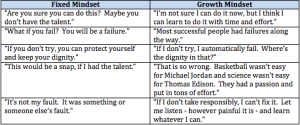Sep 25
Do You Have “The Power?”
Do you have the power of believing you can improve?
Carol Dweck is a pioneering researcher in the field of motivation. She has studied our brain’s capacity to learn and solve problems. When presented with a problem that is too hard to solve, she noticed that people react with a “fixed mindset” by thinking they are not smart enough to solve it or with a “growth mindset” by thinking they just have not solved it yet.
A fixed mindset is based on the belief that your intelligence or talent is a fixed trait and time is spent documenting and proving your traits instead of developing them. In contrast, a growth mindset is based on the belief that your most basic abilities can be developed through dedication and hard work, and your intelligence and talent are just the starting point. All great people have a growth mindset including Darwin and Tolstoy who were considered ordinary children. Carol Dweck expands on how fixed and growth mindsets affect children’s ability to learn in her Ted Talk: The Power of Believing That You Can Improve.
You can catch yourself using a fixed mindset when you notice your focus is on judging and comparing; for example, “this means I’m a loser,” “this means they are a better person than me,” or “this means my partner is selfish.” The key to shifting to a growth mindset is to use powerful questions. Instead of judging yourself or others, ask instead: “what can I learn from this, how can I improve, or how can I help my partner do this better?” Here are some additional examples of how to shift from a fixed mindset to a growth mindset:

Over time it gets easier to catch yourself in a fixed mindset and shift to a growth mindset where you can take on challenges wholeheartedly and learn from setbacks. With a growth mindset, you are able to take inspired action, moving you closer to your dreams.
Adapted from http://mindsetonline.com